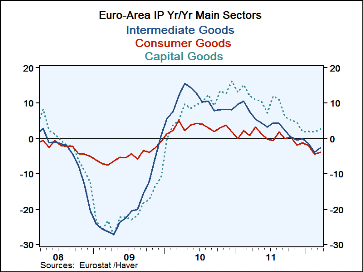 Global| May 14 2012
Global| May 14 2012Euro-Area IP is Up in March and Still Off Year/Year
Summary
Euro-area industrial production (IP) rose by 0.9% m/m in March. It is still lower by 1.3% y/y but is sequentially cutting its losses and is up over three months at a 1.6% annual rate. The output of consumer durable goods and [...]
 Euro-area industrial production (IP) rose by 0.9% m/m in March. It is still lower by 1.3% y/y but is sequentially cutting its losses and is
up over three months at a 1.6% annual rate.
Euro-area industrial production (IP) rose by 0.9% m/m in March. It is still lower by 1.3% y/y but is sequentially cutting its losses and is
up over three months at a 1.6% annual rate.
The output of consumer durable goods and nondurable goods is still declining at aggressively faster rates, however. The sense of a pick-up is on the back of capital goods trends supported by intermediate goods.
Despite these trends in the quarter-ended March, IP was still falling overall and is dropping for all the major components except capital goods which post a rise of 0.7% at an annual rate in Q1. Overall IP is falling at a 2.2% pace in Q1.
Among EU/EMU members listed in the table only Germany has a rise in IP in Q1. France is near zero and the UK is at zero. Ireland is laboring under a massive 18% annual rate decline with Italy’s large 8% drop also in place. Portuguese IP is off at a 2.4% pace and Spain’s is off at a 1.7% pace.
Germany and France are showing IP acceleration from tweleve months to six months to three months; each has positive rate of growth over three months. Oddly Portugal is in that same camp with weaker 12-month and 6-month growth and stronger 3-month growth. For Ireland, Spain and Italy deep and deepening rates of negative growth in IP output is more the rule. The UK continues to see more slippage but on milder negative rates of growth.
| Euro-Area MFG IP | ||||||||||
|---|---|---|---|---|---|---|---|---|---|---|
| SAAR Except M/M |
Mo/Mo | Mar 12 |
Feb 12 |
Mar 12 |
Feb 12 |
Mar 12 |
Feb 12 |
|||
| Euro-Area Detail |
Mar 12 |
Feb 12 |
Jan 12 |
3 Mo |
3 Mo |
6 Mo |
6 Mo |
12 Mo |
12 Mo |
Q:2 D |
| MFG | 0.9% | -0.4% | -0.1% | 1.6% | -4.0% | -1.2% | -7.7% | -1.3% | -2.0% | -2.3% |
| Cons | 0.7% | -1.5% | -0.8% | -6.3% | -8.4% | -4.7% | -9.1% | -3.8% | -4.5% | -7.7% |
| Cons Durables |
-0.2% | -1.7% | 0.2% | -6.8% | -6.3% | -5.8% | -12.8% | -6.0% | -6.2% | |
| C-Non durables |
0.8% | -1.3% | -0.8% | -5.2% | -8.1% | -4.6% | -8.6% | -3.4% | -4.0% | |
| Intermed | 1.0% | -1.4% | 0.7% | 1.1% | -6.2% | -2.9% | -8.6% | -2.8% | -3.9% | -2.1% |
| Capital | 1.1% | 1.4% | -0.4% | 8.8% | -0.1% | 3.8% | -5.6% | 2.7% | 1.8% | 0.7% |
| Main Euro-Area Countries and UK IP in MFG | ||||||||||
| Mo/Mo | Mar 12 |
Feb 12 |
Mar 12 |
Feb 12 |
Mar 12 |
Feb 12 |
||||
| MFG Only | Mar 12 |
Feb 12 |
Jan 12 |
3 Mo |
3 Mo |
6 Mo |
6 Mo |
12 Mo |
12 Mo |
Q:2 D |
| Germany | 1.4% | 0.3% | 1.1% | 11.5% | -2.8% | 2.1% | -5.6% | 1.8% | 1.4% | 0.9% |
| France:IPx Const |
-0.9% | 0.9% | 0.2% | 0.9% | -1.3% | -0.2% | -2.7% | -0.9% | -1.4% | -0.4% |
| Italy | 0.6% | -0.9% | -2.5% | -10.9% | -8.1% | -4.3% | -13.2% | -5.4% | -6.3% | -8.0% |
| Spain | -2.5% | -3.9% | 2.6% | -14.7% | -1.0% | -10.1% | -8.1% | -9.2% | -7.1% | -1.7% |
| Ireland | -2.7% | -3.2% | 0.7% | -19.0% | -1.1% | -15.0% | -20.5% | -5.8% | -3.1% | -18.9% |
| Greece | -1.7% | -2.7% | 4.2% | -1.6% | -4.2% | -13.5% | -9.3% | -8.8% | -8.3% | 5.4% |
| Portugal | 2.3% | 0.5% | 0.1% | 12.2% | -3.2% | -4.0% | -17.5% | -5.8% | -7.2% | -2.4% |
| UK: EU member |
0.8% | -1.0% | -0.3% | -2.1% | -0.8% | -0.8% | -2.5% | -0.9% | -1.5% | 0.0% |
| Some Euro-Area reporters are timely and some lag. This table allows a sequential inspection of trends regardless of topicality |
||||||||||
Robert Brusca
AuthorMore in Author Profile »Robert A. Brusca is Chief Economist of Fact and Opinion Economics, a consulting firm he founded in Manhattan. He has been an economist on Wall Street for over 25 years. He has visited central banking and large institutional clients in over 30 countries in his career as an economist. Mr. Brusca was a Divisional Research Chief at the Federal Reserve Bank of NY (Chief of the International Financial markets Division), a Fed Watcher at Irving Trust and Chief Economist at Nikko Securities International. He is widely quoted and appears in various media. Mr. Brusca holds an MA and Ph.D. in economics from Michigan State University and a BA in Economics from the University of Michigan. His research pursues his strong interests in non aligned policy economics as well as international economics. FAO Economics’ research targets investors to assist them in making better investment decisions in stocks, bonds and in a variety of international assets. The company does not manage money and has no conflicts in giving economic advice.






